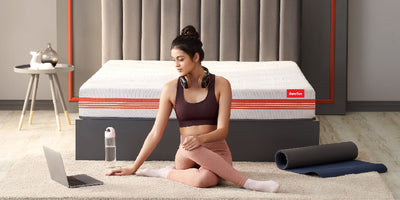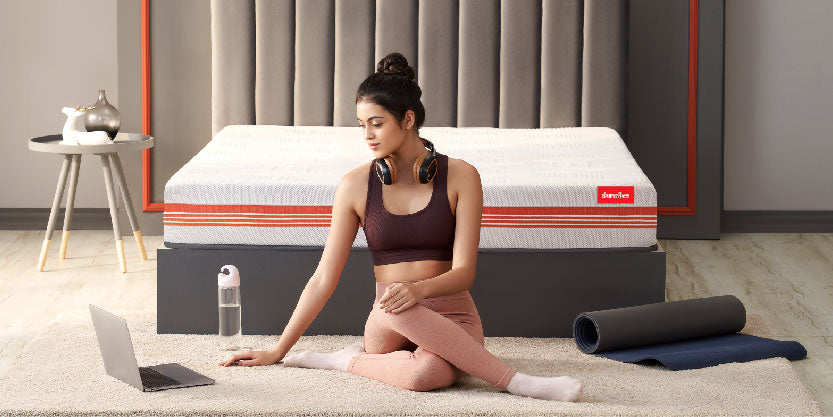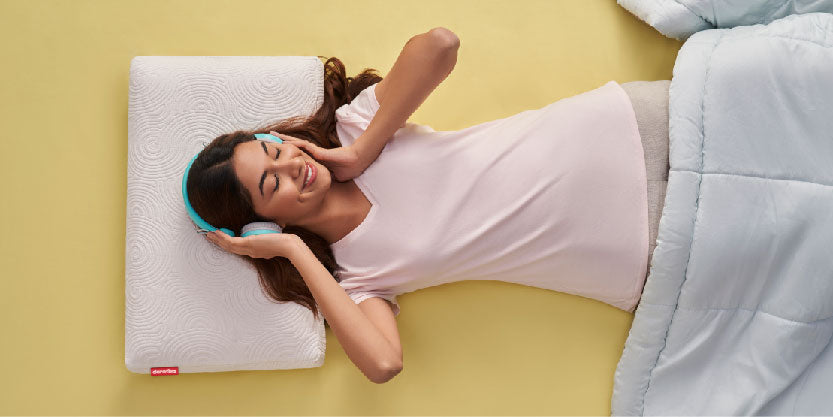Everything you need to know to develop a healthy sleep routine.
At a time when the importance of a strong immune system is being felt the most, it becomes crucial to understand the science of strengthening our immunity for the better. What do you think contributes to it? A balanced diet, immunity-boosting superfoods and regular exercise? Most definitely, but there is another immunity-boosting superpower that we are all naturally equipped with, which we very often ignore. It is nature’s best attempt yet to help us rejuvenate daily and lead a long and healthy life. This superpower is sleep.
For centuries, many have known that sleep is the backbone of our lives but the culture of hustle has long underplayed the importance of sleep. We do not think twice about losing sleep to finish a presentation, in fact, we applaud it. Most of us working professionals are guilty of binge sleeping where we don’t get enough sleep during the weekday and try to compensate for the loss by sleeping extra over the weekend. In our social lives too, leaving a party early is looked down upon. In a culture where sleeping is for wimps, most of us are perennially sleep-deprived and this has devastating consequences. In fact, India is today the second most sleep-deprived nation in the world according to a recent study.
As we all start inculcating good hygiene habits it is also time to start paying attention to our sleep habits.
THE INFECTION FIGHTING POWER OF SLEEP
Sleep affects the way we look, feel and function. The brain starts mapping, processing and storing information as we sleep. Hence if you feel staying up all night to work on a presentation is a good idea, it actually might not be worth it. Good deep sleep is critical to retain information and wake up with sharp focus. Poor sleep can reduce your concentration levels and impair cognitive function.
Another important task our body undertakes when we sleep is the removal of harmful toxins and the generation of infection-fighting antibodies. Weary muscles recover and essential hormones are regulated.
A healthy 7-8 hours of sleep is highly recommended for the body for its immune system to be in the best fighting shape. Cytokines, a special type of protein, produced and released during sleep highly impact our immunity. They regulate body’s response to diseases and infections. So, if you are suffering from a disturbed sleep cycle or sleep deprivation, you will not be able to produce enough cytokines and that will eventually weaken your immunity.
In a controlled medical study done by Dr. Aric Prather at the University of California, San Francisco in connection with common cold and rhinoviruses, it was observed that the virus infection rate fell dramatically for participants who had slept for 7 hours or more prior to the experiment. The infection rate was 50 % for those who were slept for 5 hours or less. An 18% drop was observed for those who slept for 7 hours or more.
While sleep cannot be touted as a guarantee to prevent contracting the novel virus, 7 to 8 hours of healthy sleep can help boost our ability to fight it. As we are all staying at home practicing social distancing, hand washing, adding immunity-boosting food to our diet let us also pay attention to this natural immunity-increasing superpower which is free, proven and has no side effects.
TIPS TO DEVELOP A HEALTHY SLEEP ROUTINE
Here are 10 tips to follow to improve sleep quality and harness the rich benefits of sleep.
-
Get the right amount of sleep:
Adults need 7-8 hours of sleep per night to function their best. Kids need even more. So, make sure to develop a pattern of getting a good 7-8 hours of sleep every night consistently. Studies done show that people sleeping for 5 hours a night have a 65% higher likelihood of dying younger. There is also a higher risk of diabetes and poor heart health. -
Develop a regular sleep routine:
Creating regularity is the first step towards inculcating a good sleep habit and keeping sleep disorders at bay. Go to bed and wake up at the same time everyday irrespective of whether it a weekday or the weekend. Just like you set a wake-up alarm, set a go to bed alarm that works as per your routine. Try to stay away from the allure of the snooze button of your morning alarm. This is because the accumulated cardiovascular response of the body to repeated snooze alarm can be bad for your cardiovascular health. -
Eat earlier and lighter:
Indulging in a heavy dinner prolongs digestion, hence interfering with sleep. It is therefore recommended to eat light and at least 3-4 hours before going to bed. -
Reduce alcohol:
Alcohol is not a sleep aid, it acts more like a sedative and sedation is not sleep. Alcohol knocks out the pre front cortex of your brain leading to disturbed sleep and diluting the quality of your deep sleep. -
Have coffee earlier in the day:
Caffeine is a stimulant and can prevent you from falling asleep or wake you up after you sleep. Caffeine is a psychoactive drug and it takes a long time to leave the body. 50% of the caffeine we consume becomes non-active within 6 hours, but the next 25% takes another 6 hours to become non-active in our brains. This means that if we have a cup of coffee at noon, a quarter of that coffee still stays in our brains at midnight, stimulating it and preventing sleep. Caffeine is best consumed a good 16 hours before bedtime. -
No gadgets in bed:
This is the hardest one but quite worth it. Create a gadget-free zone around yourself at least 2 hours before bed. The blue light of the screen disturbs the production of sleep hormone (melatonin) and the constant information intake in the form of news can make it hard to fall asleep. -
Stay cool:
Our bodies sleep best at cool temperatures, ideally 18-21 degrees. Having a cool room is a good sleep aid. Another way to achieve this is to take a hot bath before bed. This helps in dropping the core temperature which helps in inducing sleep. -
Healthy sleep environment:
Besides keeping the room cool, a clean and uncluttered sleep environment helps in putting your mind at ease and fall asleep faster. More books and fewer gadgets should be the approach. Pay special attention to the support and firmness of your mattress if you exercise and travel quite a lot. -
A Good Mattress:
A good, scientifically designed mattress can help improve the quality of sleep. Always put some thought into selecting a mattress that gives the desired personal comfort and good support through the night. -
Wind down:
Dedicate a few minutes to stretching or wind-down meditation. Practicing Yoga Nidra is a great way to relax, forget the anxieties of the day and prepare your mind and body to sleep. A calm mind and relaxed body are key to a peaceful sleep.
Remember sleep is immune therapy for your mind and body. It is a super drug, it is free, it is legal and its fun. It has no side effects, so don’t use it in moderation.
#Sleepforimmunity #Staysafe #Stayhome #Covid19





















 Extra 5% off with code SAVENOW
Extra 5% off with code SAVENOW